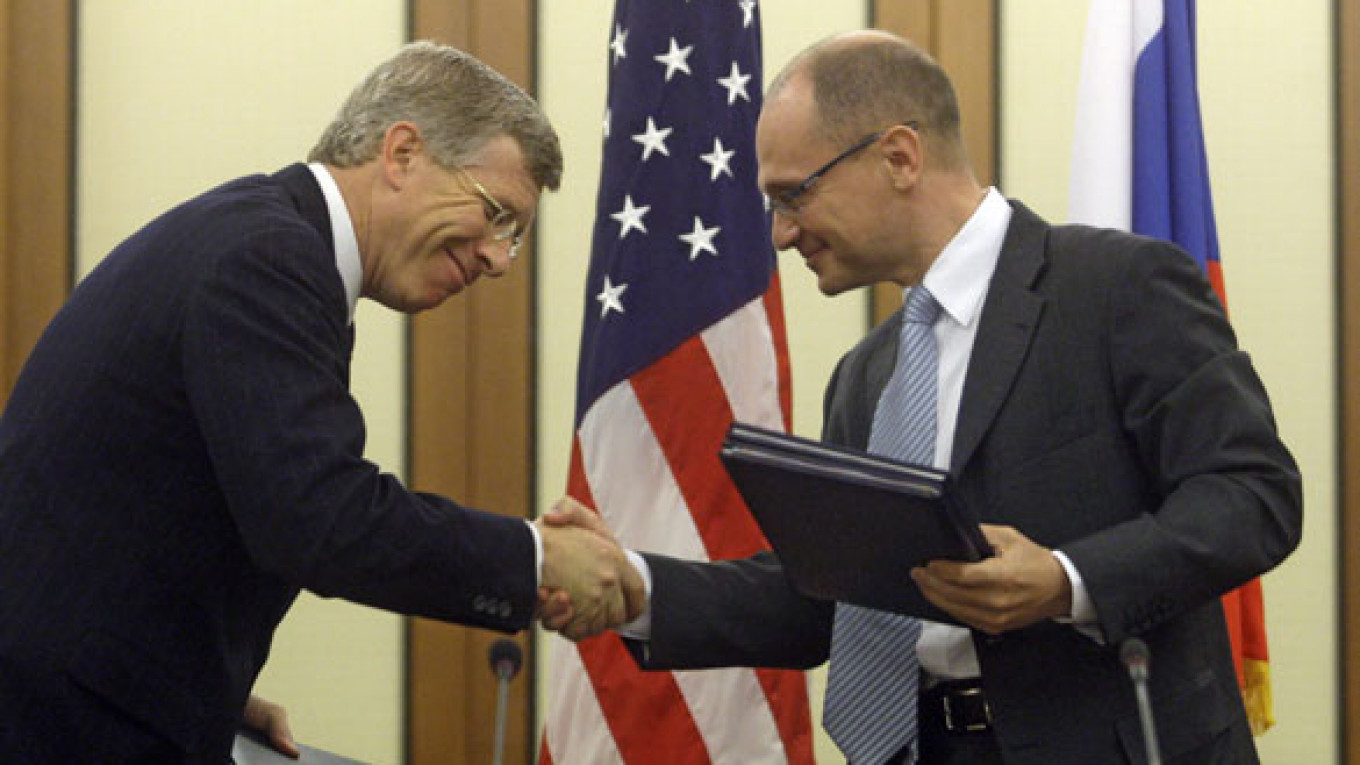Russia and the United States agreed Tuesday to carry out a feasibility study on removing bomb-grade uranium from Russian research reactors.
“Together we've done a great deal in returning fuel from third countries. But it is right that we set an example in our countries, too,” Rosatom general director Sergei Kiriyenko said as he signed the deal with U.S. Deputy Energy Secretary Daniel Poneman in Moscow.
This is the first time Russia has committed to replacing the weapons-grade fuel in its own research reactors under a U.S. led program to secure the world's vulnerable nuclear materials, even though it has taken a lead role in repatriating fuel from other countries.
There are an estimated 120 to 130 research reactors in the world that are fueled by weapons-grade uranium, about half of which are in Russia. Fearing that terrorists could use stolen material to make a bomb, the United States has been sponsoring a drive to convert reactors to use less-enriched fuel.
Kiriyenko said the feasibility studies would examine the economic implications of converting six research reactors to low-grade fuel. He declined to set a date by which the process of conversion might be completed.
The Rosatom chief said Russia and the United States had so far been concentrating on repatriating fuel from countries with more vulnerable facilities, together importing 2,700 kilograms of highly enriched uranium, which he said was enough to make 112 warheads.
Nuclear security expert Matthew Bunn hailed the deal as “important progress,” but said it had been “a long time coming.”
“I would like to have seen by now actual action on the ground to convert quite a number of these reactors, which are plainly feasible to convert. But it's better than nothing,” said Bunn, who publishes an annual report titled "Securing the Bomb" and is a former advisor to the U.S. government on nuclear security.
More milestones in nonproliferation were reached last week when Russia announced that it had opened the world's first uranium bank. The Siberian fuel reserve is the first of several such banks that will operate under the auspices of the UN nuclear watchdog, the International Atomic Energy Agency.
The concept behind the bank is that the guarantee of a reliable supply of nuclear fuel will dissuade other countries interested in nuclear energy from developing their own enrichment capabilities.
The United States won approval from the IAEA last Friday to build a similar bank.
A framework agreement by Russia and the United States on nuclear cooperation for peaceful purposes, called the 123 agreement, was signed in 2008, and is under consideration by congress. If no objections are raised in the next two weeks, it could enter into force by the end of December.
Kiriyenko says this pact should stimulate the two countries to consider joint ventures and even joint production of next generation reactors.
Kiriyenko told reporters that “if there is demand that no one can satisfy quickly, it becomes a topic for cooperation,” which could involve the production of small-capacity reactors for sale to developing countries.
About 60 new nuclear power stations are under construction now worldwide, Poneman said. The price of uranium has risen on the expectation of a boom in demand, from about $40 in the summer to about $60 today.
Rosatom's uranium mining division ARMZ last month bought a 51 percent stake in Canada's First One, which owns mines in Wyoming.
The sale prompted speculation that the United States has lost control of its nuclear cycle after the Financial Times reported Monday that the deal could give ARMZ control over half of U.S. uranium production by the middle of the decade.
Poneman said such concerns “reflect a misunderstanding of the nature of the global nuclear fuel cycle.”
“We are moving toward a more integrated nuclear industry. That's a fact of life,” Poneman said. The modern nuclear cycle means that different countries are involved in the supply, enrichment, transportation and storage of uranium, he said, and the United States has remained a major player.
Kiriyenko hailed a “major change in mentality” from the days when nations, including Russia, “thought we had to have everything on our territory.”
But Russian environmentalists fear that “integration” is simply a euphemism for turning the country into a global nuclear dump.
“The 123 agreement includes a clause that allows the signatories to send nuclear materials to each other for reprocessing and storage,” said Vladimir Churpov, head of Greenpeace Russia’s energy unit. The country does not have the capacity to reprocess the received material, so it is likely to be stored for decades, he said.
“Reprocessing would require the development of a new facility because the United States demands that reprocessing does not produce plutonium. It is not clear that Rosatom could develop such a plant on the experimental level, let alone on an industrial scale,” Churpov said.
A Message from The Moscow Times:
Dear readers,
We are facing unprecedented challenges. Russia's Prosecutor General's Office has designated The Moscow Times as an "undesirable" organization, criminalizing our work and putting our staff at risk of prosecution. This follows our earlier unjust labeling as a "foreign agent."
These actions are direct attempts to silence independent journalism in Russia. The authorities claim our work "discredits the decisions of the Russian leadership." We see things differently: we strive to provide accurate, unbiased reporting on Russia.
We, the journalists of The Moscow Times, refuse to be silenced. But to continue our work, we need your help.
Your support, no matter how small, makes a world of difference. If you can, please support us monthly starting from just $2. It's quick to set up, and every contribution makes a significant impact.
By supporting The Moscow Times, you're defending open, independent journalism in the face of repression. Thank you for standing with us.
Remind me later.






